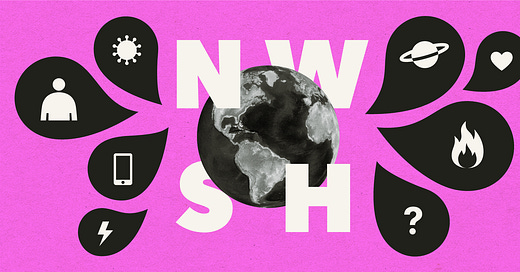New Week Same Humans #47
OpenAI's revolutionary new tool turns plain English into code. US legislators feel the wrath of the crypto elite. Plus more news and analysis from this week.
Welcome to the mid-week update from New World Same Humans, a newsletter on trends, technology, and society by David Mattin.
If you’re reading this and you haven’t yet subscribed, join 18,000+ curious souls on a journey to build a better shared future 🚀🔮
💡 In this week’s Sunday note I wrote about the weird relationship between science-fiction and reality in 2021. Go here to read Your Sci-Fi Future.💡
This week, OpenAI launch a new tool that has coders asking: is my career over?
Also, wildfires surround Athens and give rise to an unforgettable image of our heated world. And Biden’s $1.2 trillion infrastructure bill angers the nascent crypto elite.
Let’s go!
💭 A world of pure imagination
This week, two signals of the ways in which AI will change the nature, and uses, of human creativity.
OpenAI announced Codex, a new tool that seamlessly turns plain English into code. Just say what you want, and Codex will turn the instruction into code and then execute it. As you’d expect, it’s all powered by OpenAI’s GPT-3 language model.
Here, Codex builds a simple space video game out of instructions such as: now add an image of an asteroid.
An earlier version of Codex fuelled Github Copilot, an advanced autocomplete tool for coders that I wrote about in New Week #42. But this version is more powerful. And anyone, even those who can’t write a single line of code, can use it.
The tool has its limitations; no one is saying it can replace a human expert. But it already has some people half-jokingly asking: is my career over?
Meanwhile, actor Val Kilmer partnered with startup AI Sonantic to create an eerily accurate artificial rendition of his voice.
It’s more than just another AI marketing stunt. As the world learned in the recent auto-biopic VAL, narrated by the actor’s son Jack, Kilmer lost his voice in 2015 after a tracheotomy to treat throat cancer. He hopes the AI voice will open new creative and professional doors.
⚡ NWSH Take: Two seemingly disparate stories. But a shared set of issues underlie both. // AI is set to deform the economics of knowledge and creative industries we once supposed were immune to its incursions. In a world in which an AI can be a junior coder, who needs a junior coder ever again? When the most popular actors can create convincing AI incarnations of themselves, will those incarnations be served into the TV and film market even as the real actor behind them ages, and then dies? // But as AI commodifies everything in sight, it will find itself in a never-ending race with human creativity. When anyone can build a video game just by telling their computer to build a video game, it will be those with the wildest, weirdest, most compelling ideas who’ll win. In that way, AI is fuelling a shift away from technical skills and towards a world of pure imagination. Which is great news for those who are imaginative, and not so much for those who aren’t.
☀️ We did start the fire
You already know about the new IPCC report: a ‘code red for humanity’ according to UN Secretary General António Guterres.
Its publication coincided with the fierce heatwave currently battering much of southern Europe. Temperatures in Athens have reached 47C. The forest on the city’s northern fringes has burned for a week; so too has the small island of Evia, just off the coast.
This video of Evia’s residents being evacuated by ferry is an almost hallucinatory vision of climate apocalypse.
Read the IPCC report, and it’s hard to believe we’ll limit warming to 1.5C. That means a world fundamentally changed. And scenes such as those above played out on a world-historic scale: the UN estimates around 200 million people will become climate migrants by 2050.
One implication? The old conservative vs progressive dichotomy, which still structures our politics, is exhausted. We need a reorientation around the central, unavoidable choice we now face: prepare for a 1.5C+ world, or don’t prepare.
💸 Overhead power line
President Biden’s new landmark $1.2 trillion infrastructure bill caused a meltdown in cryptoland this week.
Biden wants to raise money to pay for all those new roads, bridges and Amtrak trains by tightening the regulations that govern digital assets. A provision in the bill declares that any broker of a crypto transaction – essentially, anyone who manages or facilitates such a transaction – must collect the details of the parties involved and send them to the IRS.
A single provision, two major blows. The first against the anonymity that has always been central to crypto culture, and the second against the ease with which people transacting in crypto can evade taxes. Cue measured and definitely non-hysterical reactions from the Crypto Bros:
The bill has passed the Senate, and now moves to the House of Representatives.
⚡ NWSH Take: To be fair to the Crypto Bros of Twitter, which include Jack Dorsey, the language in the bill is ambiguous on who can be considered a broker, and that’s a problem. Still, there’s something telling about this hissy fit. // Dorsey et al say crypto will fuel a Great Decentralisation that hands power to the people. The shape of the backlash against this bill reveals a more complex truth. In fact, soft control of crypto is coalescing around a new elite able to leverage wealth, online influence, or both to prosper in the Decentralised Wild West. // The revelation moment? When Elon Musk played with the price of Dogecoin via his May SNL appearance, the idea that cryptocurrencies sit outside real-world power structures was exposed as a fantasy. That emphatically doesn’t mean crypto can’t be a force for good. But let’s be realists, rather than naive utopians. A new, shadow financial elite is taking shape, and they’re moving to protect their interests. We should start to think about where ours lie.
🗓️ Also this week
🙌 Before the news, a shout out to the brilliant BrainPint: a newsletter on business, the creator’s journey, and personal growth by Janel Loi. Each week, Janel curates a handful of longreads, a batch of maker tools, and key productivity learnings into one compact and compelling package. I find it supercharges my week; sign up and it can do the same for you!
🪐 NASA is recruiting for a year-long simulated mission to Mars. The chosen ones, who must have a STEM degree or be a pilot, will spend 12 months inside a 1,700-square-foot dome that simulates the Martian surface.
🤖 AI researchers at Stanford have proposed the AI Shibboleth Rule. It says an AI should always identify itself as such if asked to by any agent.
🚗 Tech journalist and sci-fi writer Cory Doctorow says Uber was a vast grift that is now on the verge of collapse. At least Travis will be able to afford proper taxis.
🧑💻 Google have told staff they may face a salary cut if they choose to work from home. The company has launched a ‘pay calculator’ tool internally so that Googlers can see how their pay will be affected.
🛰️ SpaceX says it will buy satellite data startup Swarm. Swarm has 120 satellites in orbit, and its data and technologies will be put to work on Musk’s Starlink satellite broadband internet project.
🦠 MIT scientists are developing a drug that can cure any viral infection. DRACO works by targeting a type of RNA produced only in cells that have been infected by viruses.
📈 This economist says startup BioNTech, which developed a COVID vaccine for Pfizer, will boost the GDP of Germany by 0.5% in 2021. The company says its Malburg factory can produce vaccine doses at a rate of 1 billion per year.
🤔 Chinese tech giant Xiaomi have launched a new robot dog called CyberDog. Remind you of anyone?
🌍 Humans of Earth
Key metrics to help you keep track of Project Human.
🙋 Global population: 7,885,575,288
🌊 Earths currently needed: 1.7902754888
💉 Global population vaccinated: 15.8%
🗓️ 2021 progress bar: 61% complete
📖 On this day: On 11 August 1942 the Hollywood actress Hedy Lamarr receives a patent for her frequency-hopping spread spectrum method of transmitting radio signals, which come to play a central role in wireless telephones and wifi.
On the Wild Side
Thanks for reading this week.
The world of pure imagination that AI is forging will be a weird and wonderful place.
But even that won’t be enough to liberate us from a powerful truth: in the new world we’re building, we remain the same old humans.
Spread the word about our growing community, and you help supercharge our mission to explore the implications of that insight.
So if you found today’s instalment valuable, why not take a second to forward this email to one person – a friend, relative, or colleague – who’d also enjoy it? Or share New World Same Humans across one of your social networks, and let others know why you think it’s worth their time. Just hit the share button:
I’ll be back on Sunday. Until then, be well,
David.
P.S Huge thanks to Nikki Ritmeijer for the illustration at the top of this email. And to Monique van Dusseldorp for additional research and analysis.







